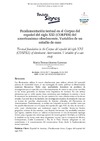Identificador persistente para citar o vincular este elemento:
https://accedacris.ulpgc.es/jspui/handle/10553/58292
| Campo DC | Valor | idioma |
|---|---|---|
| dc.contributor.author | Cáceres-Lorenzo, María Teresa | - |
| dc.date.accessioned | 2019-12-10T10:54:11Z | - |
| dc.date.available | 2019-12-10T10:54:11Z | - |
| dc.date.issued | 2020 | - |
| dc.identifier.issn | 0718-0934 | - |
| dc.identifier.other | WoS | - |
| dc.identifier.uri | https://accedacris.ulpgc.es/handle/10553/58292 | - |
| dc.description.abstract | Los diccionarios utilizan la marca obsolescencia para indicar, además del potencial proceso de mortandad léxica, el uso restringido de ciertas palabras en determinados contextos discursivos. Todas estas posibilidades descubren un problema de investigación que se especifica en el desconocimiento de cómo se usan estos vocablos en los textos generados en distintas áreas lingüísticas de América. En este trabajo planteamos que es viable aportar datos sincrónicos que clarifiquen lo anterior a través de reconocer los parámetros con los que aparecen las voces obsolescentes en los textos actuales. Con este fin se ha diseñado una investigación empírica de estudio de caso con un lexicón de vocablos obsolescentes de América obtenidos del Diccionario de Americanismos. Posteriormente, se realizó una búsqueda textual de aquellas voces que fue posible documentar en el Corpus del español del siglo XXI. Se trata de noventa y ocho voces obsolescentes que analizamos según las variables ficción/no ficción, geográfica, número de documentos y sus distintas frecuencias. Los resultados muestran que algunas unidades léxicas se utilizan exclusivamente en una determinada tipología textual, pero el grupo más numeroso aparece de manera general. También, se evidencia la similitud en los textos entre áreas lingüísticas vecinas, con la excepción de México, Centroamérica, Caribe Continental y Río de la Plata. Nuestra indagación es una contribución a la caracterización del americanismo léxico desde la fundamentación textual sincrónica. | - |
| dc.description.abstract | Dictionaries use the obsolescence mark to indicate, in addition to the possible process of lexical mortality, the restricted use of certain words in certain discursive contexts. All these possibilities uncover a problem of investigation that is specified in the ignorance of how these words are used in the texts generated in different linguistic areas of America. In this work, we propose that it is possible to provide synchronic data that clarifies the above by recognizing the parameters with which the obsolescent voices appear in the current texts. To this end, an empirical case study research has been designed with a lexicon of obsolete American words obtained from the Diccionario de Americanismos. Subsequently, a textual search of those voices that were possible to document in the Corpus del español del siglo XXI was realized. These are ninety-eight obsolescent voices that we analyze according to the variables fiction / non-fiction, geographical, number of documents and their different frequencies. The results show that some lexical units are used exclusively in a textual typology, but the most numerous group appear in general way. In addition, the similarity in texts between neighboring linguistic areas is evident, with the exception of Mexico, Central America, Caribe and Rio de la Plata. Our exploration is a contribution to the characterization of lexical Americanism from the synchronic textual foundation. | - |
| dc.language | spa | - |
| dc.relation.ispartof | Revista Signos | - |
| dc.source | Revista Signos [ISSN 0718-0934], v. 53 (102), p. 144-169 | - |
| dc.subject | 57 Lingüística | - |
| dc.subject | 570504 Lexicología | - |
| dc.subject.other | Español de América | - |
| dc.subject.other | Obsolescencia léxica | - |
| dc.subject.other | Corpus del español del siglo XXI | - |
| dc.subject.other | Spanish of America | - |
| dc.subject.other | Lexical obsolescence | - |
| dc.subject.other | Corpus of the Spanish of the 21st century | - |
| dc.title | Fundamentación textual en el Corpus del español del siglo XXI (CORPES) del americanismo obsolescente. Variables de un estudio de caso | - |
| dc.title.alternative | Textual foundation in the Corpus del español del siglo XXI (CORPES) of obsolescent Americanism. Variables of a case study | - |
| dc.type | info:eu-repo/semantics/article | - |
| dc.type | Article | - |
| dc.identifier.doi | 10.4067/S0718-09342020000100144 | - |
| dc.identifier.isi | 000518441800007 | - |
| dc.description.lastpage | 169 | - |
| dc.identifier.issue | 102 | - |
| dc.description.firstpage | 144 | - |
| dc.relation.volume | 53 | - |
| dc.investigacion | Artes y Humanidades | - |
| dc.type2 | Artículo | - |
| dc.contributor.daisngid | No ID | - |
| dc.description.numberofpages | 26 | - |
| dc.utils.revision | No | - |
| dc.contributor.wosstandard | WOS:Caceres-Lorenzo, MT | - |
| dc.date.coverdate | Enero 2020 | - |
| dc.identifier.ulpgc | Sí | es |
| dc.description.sjr | 0,314 | |
| dc.description.jcr | 0,585 | |
| dc.description.sjrq | Q1 | |
| dc.description.jcrq | Q4 | |
| dc.description.ahci | AHCI | |
| dc.description.ssci | SSCI | |
| dc.description.erihplus | ERIH PLUS | |
| item.grantfulltext | open | - |
| item.fulltext | Con texto completo | - |
| crisitem.author.dept | GIR IATEXT: División de Estudios de Corpus y Lingüística Aplicada | - |
| crisitem.author.dept | IU de Análisis y Aplicaciones Textuales | - |
| crisitem.author.dept | Departamento de Filología Hispánica, Clásica y de Estudios Árabes y Orientales | - |
| crisitem.author.orcid | 0000-0002-1683-9025 | - |
| crisitem.author.parentorg | IU de Análisis y Aplicaciones Textuales | - |
| crisitem.author.fullName | Cáceres Lorenzo, M. Teresa | - |
| Colección: | Artículos | |
Visitas 5
279
actualizado el 01-nov-2024
Descargas
156
actualizado el 01-nov-2024
Google ScholarTM
Verifica
Altmetric
Comparte
Exporta metadatos
Los elementos en ULPGC accedaCRIS están protegidos por derechos de autor con todos los derechos reservados, a menos que se indique lo contrario.
